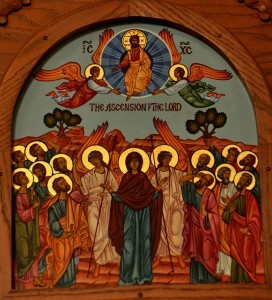Why Proclaim that Christ Ascended? (Heidelberg Catechism Q46)

 Ascension Icon cc by Ted 2.0
Ascension Icon cc by Ted 2.0One traditional Christian teaching that many today simply ignore is Christ’s “Ascension.” Why proclaim that Christ ascended into heaven?
One answer is that it is simply biblical. You find it at the end of both Mark and Luke, but Acts 1 is the version that sticks in our collective memory. The risen Christ has just given the Acts version of the Great Commission:
When he had said this, as they were watching, he was lifted up, and a cloud took him out of their sight.” (Acts 1:9, NRSV)
Jerusalem, we have lift-off.
But if post-Enlightenment Christians have a hard time thinking about Jesus walking on water, the ascension doesn’t even enter their consciousness.
But the story communicates a number of important things, some pretty basic and some more subtle.
Why proclaim Christ Ascended?
On the basic side, Christ’s ascension to heaven affirms his bodily resurrection while giving a clear reason that we don’t bump into him on the street.
The Heidelberg Catechism (that classic exposition of biblical theology beloved of the Reformed Tradition and on which I’ve neglected to blog for far too long) explores a number of the subtler issues. It devotes four questions to this little line of the Apostles’ Creed, one of which I discussed long ago.
Here’s the first question in the sequence:
46 Q. What do you mean by saying, “He ascended to heaven”?
A. That Christ,
while his disciples watched,
was taken up from the earth into heaven
and remains there on our behalf
until he comes again
to judge the living and the dead.
I don’t want to wrestle very hard with any of this today. I think it is better to point out the theological and poetic connections of this short statement with four aspects of our faith.
First is the affirmation of the biblical scenes, the scriptural drama in which the doctrine is rooted. Christ ascended “while his disciples watched” in Mark 16:19, Luke 24:51, and Acts 1:9.
Second is the connection to the rest of the Creed. Jesus will return “to judge the living and the dead.” (The Catechism will get to this in Question 52.)
Third I hear an allusion to the liturgy of the Eucharist in the phrase “until he comes again.” This points directly to the Words of Institution (1 Cor. 11:26). Also, in the West at least, we summarize the great “mystery of faith” saying “Christ has died, Christ is risen, Christ will come again.”
Fourth is a quiet emphasis on a central theme of the Heidelberg Catechism itself. Christ is ascended to heaven “on our behalf.”
Over and over the Catechism emphasizes how the whole of the gospel, and all of theology, is to help us. It is useful.
It isn’t just an intellectual exercise. The whole thing is to make our lives better. It is for us.
Christ is for us.
Christ died for us.
Christ’s body and blood are given for us.
Christ died, rose, ascended, reigns and will return for us.
This is also a biblical allusion of course. But that’s the point. The Catechism is teaching us biblical theology.
Theology as poetry, not as argument
These are poetic connections, intentional echoes of language across a variety of important texts.
That is different from logical arguments. Often Christians give in to our culture’s pseudo-scientific mindset, thinking we need rational proofs.
Instead what Scripture, and the best of theology, often give us is food for our souls in the form of poetry, story, and song — the things that make for a life of depth and meaning.
The post Why Proclaim that Christ Ascended? (Heidelberg Catechism Q46) appeared first on Gary Neal Hansen.



